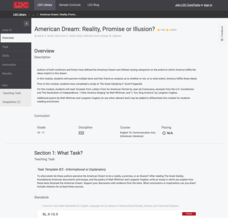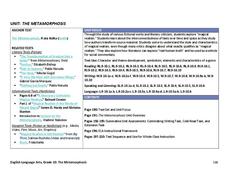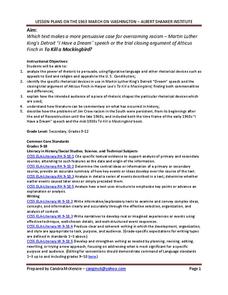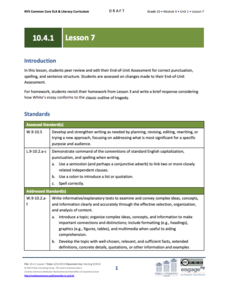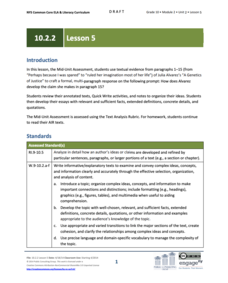Literacy Design Collaborative
American Dream: Reality, Promise or Illusion?
Dream or nightmare? Class members craft a synthesis essay with textual to determine to what extent the United States has fulfilled the ideas embodied in the America Dream.
Orange Public Schools
Stagecraft
The house lights dim, the curtain parts, lights slowly come up, revealing the stage. Before the actors appear, before a word is spoken, the audience is drawn in by the lighting, by the colors, by lines of the set, by the props, and...
California Department of Education
Plagiarism is Stealing!
Stop, thief! Do your pupils understand the consequences of plagiarism? Lesson three of six in a series of college and career readiness activities demonstrates the dangers of taking credit for someone else's work. Learners engage in...
Louisiana Department of Education
The Metamorphosis
How can something be true even if it didn't happen? Invite your classes to investigate the truths found in the world of magical realism as they analyze short stories, poems, informational texts, video, and art from this genre.
EngageNY
Grade 9 ELA Module 2, Unit 3, Lesson 5
After rereading the full text of Walter Mosley's essay "True Crime," groups complete an evidence collection tool worksheet, and then class members independently draft a multi-paragraph, evidence-based response that identifies how Mosley...
Dream of a Nation
Writing a Narrative Essay
Imagine using narrative essays to encourage change. This multi-week unit plan does just that. After reading a series of articles from Tyson Miller's Dream of a Nation: Inspiring Ideas for a Better America, class members examine the...
Howard Hughes Medical Institute
The Making of the Fittest: Got Lactase? The Co-evolution of Genes and Culture
Got milk? Only two cultures have had it long enough to develop the tolerance of lactose as an adult. Learn how the responsible genes evolved along with the cultures that have been consuming milk. This rich film is supplied with a few...
Curated OER
Commas, Semicolons, and Colons Using Famous Quotes
Ten famous quotes are written on these slides, at first without punctuation. After giving learners a chance to punctuate the quotes, the correct punctuation is shown. Use memorable words to develop long-term grasp of how to use commas,...
Albert Shanker Institute
Making the Case for Equality: A Comparison
Martin Luther King Jr's " I Have a Dream" speech and Atticus Finch's closing argument during the trial of Tom Robinson both address the societal need to overcome racism. After examining the rhetorical devices and figurative language used...
EngageNY
Grade 10 ELA Module 3: Unit 3, Lesson 10
Can budding writers accept constructive criticism? Learners work with their peers to gain feedback about their argumentative essay drafts. Peers give one another constructive criticism to revise their work better. Using a Peer Review...
EngageNY
Grade 10 ELA Module 3: Unit 3, Lesson 9
Let's join together and make a sentence. Scholars take the next step in revising their argumentative essays by combining independent clauses to make complex sentences. Writers use a Colon and Semicolon Handout to practice different ways...
EngageNY
Grade 10 ELA Module 3: Unit 3, Lesson 11
It's time to show what you know. Scholars finalize their argumentative essays by making last-minute revisions to conventions, tone, and formal style. Learners review the checklist to ensure they have met all the task requirements. They...
EngageNY
Grade 10 ELA Module 4, Unit 2, Lesson 22
The Witches, Lady Macbeth, or Macbeth himself: who is the culprit? Using the resource, pupils craft multi-paragraph essays to present arguments about which character is responsible for the tragedy in Shakespeare's Macbeth. Additionally,...
EngageNY
Grade 10 ELA Module 4: Unit 2, Lesson 8
Shakespeare's Macbeth has something for everyone. Scholars complete a mid-unit assessment. They craft multi-paragraph essays to analyze how the author's structural choices create tension and suspense in the play's first two acts.
EngageNY
Grade 10 ELA Module 4: Unit 1, Lesson 7
High school writers participate in peer review of their end-of-unit tasks. They begin by discussing their thought process in pairs and then editing their work. Finally, learners participate in a class discussion on the use of the...
EngageNY
Grade 10 ELA Module 4: Unit 1, Lesson 6
It's time to tie it all together. Scholars reflect on the series' past five lessons about Death of the Pig. They examine how E.B. White develops a central idea throughout the essay before responding to a writing prompt.
EngageNY
Grade 10 ELA Module 3: Unit 1, Lesson 15
It's time for the grand finale! Scholars finalize their learning in a two-part end-of-unit assessment. This assessment covers multiple standards as learners demonstrate their understanding of the central idea, comprehension, and...
Howard Hughes Medical Institute
Fact Patterns: A Film Guide
What does it take to create a scientific theory? Learners attempt to answer the question by studying the work of Charles Darwin and Alfred Russel Wallace. While watching a video, they track observations from each scientist and then look...
EngageNY
Grade 10 ELA Module 3: Unit 1, Lesson 9
Scholars examine an excerpt from The Immortal Life of Henrietta Lacks and determine how the author builds up smaller details to create the larger idea of the main passage. To finish the lesson plan, learners discuss in pairs, answer...
EngageNY
Grade 10 ELA Module 2: Unit 3, Lesson 7
It's time to show what you know. The final activity asks scholars to reflect on the seven-lesson plan unit and complete an end-of-unit task. Readers consider the claims presented in speeches by Eleanor Roosevelt and Malala Yousafzai...
EngageNY
Grade 10 ELA Module 2: Unit 2, Lesson 10
All good things must come to an end! Scholars put all their learning into practice by completing an end-of-unit assessment. They use textual evidence from Julia Alvarez's "A Genetics of Justice" to write essays analyzing how Alvarez...
EngageNY
Grade 10 ELA Module 2: Unit 2, Lesson 5
How do learners use textual evidence from a close reading to write a well-developed essay? Scholars try it by completing a mid-unit assessment based on their analysis of the first 15 paragraphs from "A Genetics of Justice" by Julia...
EngageNY
Grade 10 ELA Module 2: Unit 1, Lesson 20
Readers take all the information they gained from the last 19 lessons and complete an essay describing how King develops his purpose and claim in "Letter from Birmingham Jail." Pupils use a rubric and checklist to help guide their...
EngageNY
Grade 10 ELA Module 2: Unit 1, Lesson 10
Scholars review the previous nine lessons of analysis of King's "Letter from Birmingham Jail" and use their work to create a formal essay responding to a writing prompt about the purpose of the work. This mid-unit assessment is a quick...


